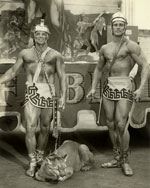
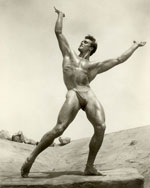
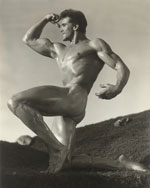
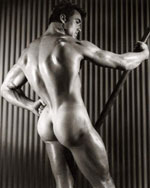
Ed Fury
Born Edmund Holovchik in June 1928 (some
sources cite 1934 as Fury's date of birth), Ed
Fury matured into a very athletic teenager. While he wrestled
in school and lifted weights, he didn't work toward the gargantuan
build as did some of his contemporaries, such as Steve Reeves
and Reg Park. Rather, his athletic and acting abilities were
used more to portray strength. His impressive physique made
him a natural contender for the Mr. Muscle Beach title in
1951 and 1953, coming in third and second, respectively.
Fury's early career consisted of modeling for various physique
studios in the 1950s, such as the Athletic Model Guild (AMG)
and Bruce of LA. In addition, Fury made several home movie
loops distributed by Apollo and AMG as 16mm and 8mm films
in the 1950s. Fury also graced the covers of a number of physique
culture magazines in the 1950s and 1960s. A six-foot tall
natural blond, Fury began acting on the legitimate stage before
entering films.
Among other vehicles, he appeared on Broadway in the show
Fanny. He can also be spotted in a number of early to mid
1950s big-budget films, including Athena (1954; with Steve
Reeves), Demetrius and the Gladiators (1954; with Victor Mature),
and Abbott and Costello Go to Mars (1953) Into the latter
part of the 1950s, Fury found larger roles in such films as
the campy Wild Women of Wongo (1958). He also worked in television
in the 1950s, appearing as a guest star during the last season
of the 1950s TV comedy My Little Margie with Gale Storm and
Charlie Farrell.
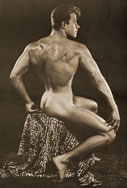
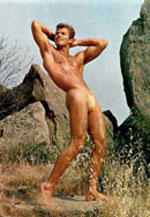
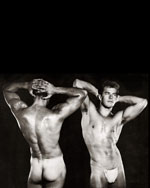
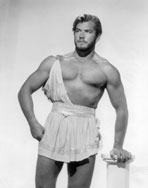
Richard Harrison
Born
in May 1935 in Salt Lake City, Utah, actor and model
Richard Harrison enjoyed a long career in films until
his retirement in the 1990s. Much like his contemporary Ed
Fury, Harrison started his career as a physique model in the
1950s and graced the covers of numerous magazines. The extremely
handsome Harrison made his film debut in the campy science
fiction effort Kronos (1957; with Jeff Morrow). Several more
films followed, including Battle Flame (1959; with Scott Brady)
and Master of the World (1961; with Vincent Price). While
he was getting steady film work, Harrison's career wasn't
in the fast lane. So, in 1961 he headed to Rome and became
a star in a string of sword and sandal films. That same year,
he married his first wife Loretta and gained James H. Nicholson,
co-owner of American International Pictures, as a father-in-law.
Harrison ran with the sword and sandal genre until it died
out in the mid 1960s. Unlike some of his contemporaries, he
easily made the transition to other film genres, including
spy films and spaghetti westerns.
Harrison's career continued to be strong throughout the 1970s
and 1980s. In the early 1990s, Harrison and his second wife
Francesca moved to Palm Springs, California. He ran for the
office of mayor in 1995 and again in 1999 but lost the race
to incumbent Will Kleindienst. The retired actor was recently
awarded a star on the Palm Springs Walk of Stars. His latest
film project is the experimental film Jerks, made in 2000.
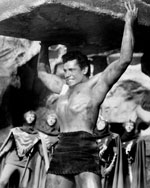
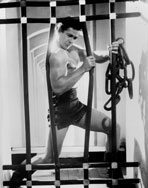
Gordon Scott
Maciste contro il vampiro (1961) Goliath and the Vampires
11x14 Silver-halide print
After his stint as Tarzan ended, Gordon
Scott began expanding his range, doing sword and sandal films,
spaghetti westerns (such as The Tramplers), and even spy thrillers
(such as Danger!! Death Ray), made mostly in Italy and Spain.
Scott became very popular in Europe and made a number of popular
features there, such as Duel of the Titans (1961, with Steve
Reeves), Samson and the Seven Miracles of the World (1962),
Goliath and the Vampires (1963), and Danger!! Death Ray (1965),
When peplum began to die as a film genre, Gordon Scott quickly
took on other roles, falling back on his cowboy days in two
films: Buffalo Bill: Hero of the Far West and The Tramplers.
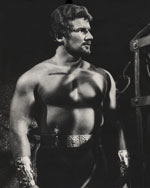
Alan Steel
il gladiatore ribelle Ursus(1963) 11x14 Silver-halide print
Alan Steel was born Sergio Ciani in
Italy. While many Hercules actors were American bodybuilders,
the handsome Steel began his acting career as a stand-in for
Steve Reeves and later played second banana to such sword
and sandal actors as Brad Harris. However, by 1964 Steel was
starring in such peplums as Hercules Against Rome (1964).
Another starring vehicle for Steel, Hercules Against the Moon
Men (1964) is one of a handful of sword and sandal movies
to incorporate science fiction into the sword and sandal genre.
Reg Park's Hercules in the Haunted World (1961; with Christopher
Lee) and Gordon Mitchell's The Giant of Metropolis (1961)
also blend sci-fi with sword and sandal.
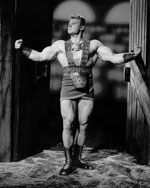
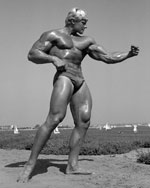
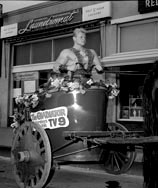
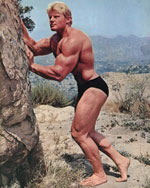
Dave Draper
Although Dave Draper never
acted in a sword and sandal film, he was once host of a Los
Angeles TV program with an emphasis on sword and sandal movies.
Billed as "David the Gladiator," Draper hosted a
movie each Saturday night on Channel 9. The station was then
known as KHJ-TV, owned by RKO. Dressed in gladiator leathers,
Draper hosted an early 1960s sword and sandal movie from 8-10
PM, on Saturday nights. The program lasted for about a year
or so, and the movies that were run featured Steve Reeves,
Reg Park, and Kirk Morris, among others. Born in New Jersey
in April 1942, Dave Draper, a 1965 Mr. America, 1966 Mr. Universe,
and 1970 Mr. World, made several film and TV appearances in
the 1960's, including Don't Make Waves (1967; with Tony Curtis)
and the entertainingly gruesome black comedy Lord Love a Duck
(1966; with Roddy McDowall). Also, he made a 1967 appearance
as Mr. Universe on the CBS-TV show The Beverly Hillbillies.
Draper eventually left acting for business endeavours and
is presently the manager of the World Gym in Santa Cruz, California.
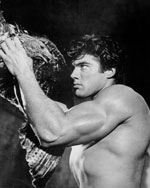
Kirk Morris
Born
Adriano Bellini in Venice, Italy, in 1938, Kirk "Kirky"
Morris worked as a gondolier in his native city beginning
in his teens. Spotted for films by an Italian producer, Morris
went to Rome in 1960 to begin a film career. Throughout his
career which lasted about ten years, Kirk Morris starred in
a number of sword and sandal films, such as Colossus and the
Headhunters. One of Morris's best films is the unusual The
Witch's Curse (1962). He portrayed Hercules at least three
times on screen, most notably in 1965's Hercules, Samson,
and Ulysses. After the peplum craze died out in the mid 1960s,
Morris's acting career began to slide. He made fewer films
after 1965, starring in a couple of westerns and war films
before leaving the screen in 1970.
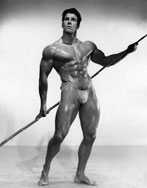
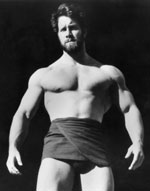
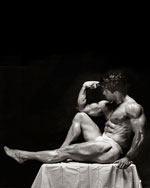
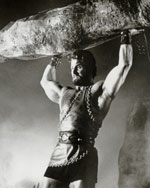
Reg Park
Famed bodybuilder Reg
Park was born in June 1928 in Yorkshire, England. Park's father
owned a gymnasium and a barbell company. The younger Park
soon followed his father's lead, competing for the Mr. Britain
title at the age of 18. In 1949, he won the Mr. Britain title
and in 1950 won the Mr. Europe competition. Park was the winner
of the Mr. Universe competition in 1951 and again in 1958
and 1965. He remained active in bodybuilding competitions
through the early 1970s and was a popular subject on the cover
of fitness magazines of the era. Park created a health instruction
and equipment business in his native England after winning
the Mr. Universe title in 1951. In the 1950s, he married a
ballerina from South Africa and later moved to South Africa
to expand his business. Among Park's business interests was
a bodybuilding magazine titled The Reg Park Journal. Beginning
in 1954, the magazine showcased some of the most prominent
bodybuilders in the 1950s; unfortunately, it ceased publication
in 1959.
Although Park's few film appearances had little bearing on
cinema history, he inspired some of today's biggest film stars,
including Arnold Schwarzenegger and Sylvester Stallone, to
begin bodybuilding. In fact, Schwarzenegger trained with Park's
help in the late 1960s, living with Park and his family in
their South African home for awhile. Park also convinced Schwarzenegger
to take the title role in the 1970 film Hercules in New York
as a money-making proposition. Today, Park continues his association
with the sport of bodybuilding as a contributor to a muscle
magazine and occasionally serving as a judge in competitions.
Park's son, Jon Jon, is a personal fitness trainer in California
whose skills have been promoted by Schwarzenegger and Oscar
De La Hoya. Park portrayed Hercules in three films in the
early 1960s: Hercules and the Captive Women (1961); Hercules
in the Haunted World (1961), and Hercules, Prisoner of Evil
(1964)
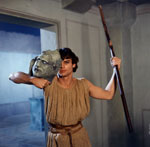
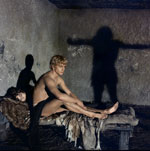
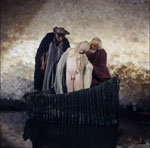
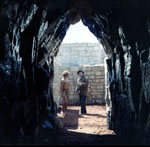 Fellini
Satyricon 11x14 C- print
Fellini
Satyricon 11x14 C- print
In 1969, four years after the demise
of the peplum film, Italy’s most famous director, Federico
Fellini embarks on filming his own fragmented nightmare of
pre-Christian Rome. Fellini takes over the largest soundstages
at “Cinecitta” where most of the peplums were
made as well. The end result would be a visual fantasy, not
only of Nero’s Rome, but the very climate of sixties
Italy.
In Fellini’s sub-conscious, the Roman landscape of Satyricon
is vaguely familiar from the decade’s previous flirtation
with Hercules and the Gods. Fellini’s Rome has outré
horizons of purple and green with citizens to match. It is
a world where Gods and Goddess still walk the earth, granting
pleasure or pain to those mortals that tempt their imagination.
We remain in that very realm of magic and death that existed
in the previous films of Samson and Hercules. Fellini cast
actor Gordon Mitchell to play the “Minotaur” in
Satyricon as an homage to his performance in The Giant of
Metropolis (Il Gigante di Metropolis) in 1961 which also took
place in a similar environment of science fiction and Ancient
Rome. Fellini Satyricon gives us images of decadence and sex
during Nero’s reign, a cinematic tradition that began
with the very advent of cinema, reaching its zenith with De
Mille’s Sign of the Cross (1932) and finally resting
within the realm of myth and magic of Zeus in the peplums
of 1960's Rome.
Physique
Photography and the Cult of Hercules
An Interview with Steeve
Reeves